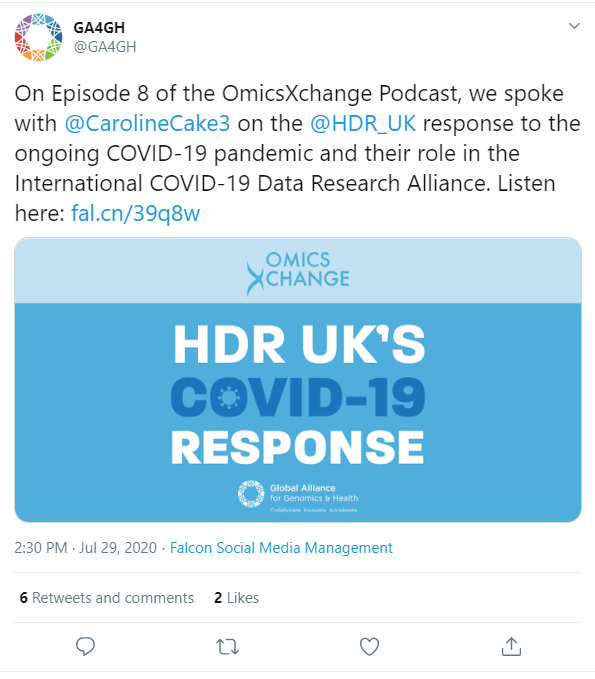HDR UK Weekly Covid-19 round up (07 August)
7 August 2020
Our weekly updates highlight the range of projects members of the HDR UK community are working on to address the COVID-19 pandemic and global challenge. Read on to find out about the latest projects and areas of work.
Read our latest SAGE report (04 August)
Updates
Link found between COVID-19 and polypharmacy
A Scottish study, whose authors include HDR UK Scotland’s Bruce Guthrie, has found that COVID-19 is associated with polypharmacy (concurrent use of multiple medications). The study confirms 17 classes of medicine to be associated with increased risk of severe COVID-19. These results support existing guidance on reducing the over-prescription of these drug classes in order to reduce the risk of severe COVID-19 cases. Included in this study were antipsychotic agents, proton pump inhibitors, opioids and gabapentinoids and their effects were stronger, the more recent the exposure.
Decreased mental wellbeing seen in younger populations in June 2020
Research from ALSPAC has been published, revealing that there has been an increase in anxiety and a decrease in wellbeing in younger populations in June 2020, in comparison to April 2020. The study suggests that anxiety and decreased mental wellbeing in response to COVID-19 is not just a short-term reactive problem, but could be the beginning of a persistent problem whose reach might extend beyond the pandemic. The most at-risk groups of being affected by this include females, those with existing mental health conditions, those with a history of financial problems as well as people who have difficulty accessing mental health information. It therefore suggested that mitigation measures should be put in place for these groups who may be disproportionally affected as a result of COVID-19.
GP practices continue to cope with service changes positively
The Rapid COVID-19 Intelligence to Improve Primary Care Response (RAPCI) Project reveals insights from 20 GP practices in Bristol, North Somerset and South Gloucestershire indicating that practices continue to innovate and cope well with the service changes brought about through COVID-19. Examples of these include engaging in complex consultations remotely, managing patient expectations through enhanced communication and setting strategies for restarting physical consultations.
Mortality rate for COVID-19 patients dropped in mid-April and May
A pre-print article has been published, stating that the rate of mortality for patients admitted to hospital with severe COVID-19 has dropped in mid-April and May in comparison to earlier in the pandemic. It reports that 30-day mortality peaked for people admitted to critical care in early April, then a decrease was sustained until the end of the study period. It is suggested that this improvement is not due to changing patient characteristics, but possibly as a result of effective treatments as part of clinical trials as well as a falling critical care burden.
Association between estrogen and COVID-19 found in ZOE symptom checker app data
Data collected through the ZOE Symptom Checker app has revealed an association between estrogen and COVID-19. Men and older women have been shown to be at higher risk of adverse COVID-19 outcomes and this has been suggested to be a result of a protective effect of the female sex hormone estrogen. Within the study, post-menopausal women had a higher rate of predicted COVID-19 and a corresponding range of symptoms. Women aged 18-45 taking the combined oral contraceptive pill had a significantly lower predicted COVID-19 hospital attendance.
12,000 UK lives could be saved by January 2021 through use of Dexamethasone
Martin Landray, HDR UK Research Director and one of the leads on the RECOVERY Trial has, alongside colleagues, published a pre-print paper showing the potential health and economic impact of dexamethasone treatment for patients with COVID-19. The study estimates that, for the UK, approximately 12,000 lives could be saved by January 2021 if the treatment were rolled out nationally. This could translate into approximately 650,000 lives globally.
Decreased COVID-19 infection rates in patients who have been vaccined with non-COVID-19 vaccines
Preliminary findings of a study has shown decreased COVID-19 infection rates in patients who have been vaccinated in the last 1-5 years for polio, Hemophilus influenzae type-B (HIB), measles-mumps-rubella (MMR), varicella, pneumococcal conjugate (PCV13), geriatric flu, and hepatitis A / hepatitis B (HepA-HepB). Theis includes significantly lower rates in Black patients who were previously vaccinated for pneumonia. Recommendations from this study include suggestions of additional pre-clinical and clinical studies to assess the protective effects of existing non-COVID-19 vaccines.
Link between severity of COVID-19 and antibody levels
A study has concluded that there is a link between severity of COVID-19 and the subsequent level of antibodies and therefore immunoprotection. Patients who had a milder form of the virus went on to have lower levels of antibodies against the virus, and this has led researchers highlighting the need to consider future vaccinations for patients who have recovered from asymptomatic or mild COVID-19.
Pre-print paper published looking into infection rates among asymptomatic patients
Insight from the use of data from the ZOE Symptom Tracker app have been published in a pre-print paper that looks into infection rates among asymptomatic COVID-19 patients. The majority of this data came from hospitalised patients rather than general population as many people were unaware that they had been infected. The study found that loss of smell showed the highest symptom specificity for COVID-19 antibody response and therefore highlights the need for further research into this area.
Lower respiratory tract identified as key indicator of progression of COVID-19 infection
Patient samples for COVID-19 testing are more commonly taken from the upper respiratory tract. However a new study has suggested that lower respiratory tract infection is a key indicator of the progression to critical illness with COVID-19 and should therefore be used as the sample site where possible. The study goes on to assert that upper respiratory tract samples have also had a significant negative rate in the past. This could be a significant insight towards improving testing efficacy and reliability.
Tweet of the week

More information and tools
1. Submit your research question or project – we are calling on anyone with a research question for COVID-19 that requires health data to share your ideas via our online form.
Questions will be shared in our HDR UK COVID-19 Knowledge + Skills Matchmaker. We prioritise all of the questions using a transparent and objective process to identify the questions that most urgently need to access to data. Progress of the prioritised questions is reported weekly to the government’s Scientific Advisory Group for Emergencies (SAGE).
2. HDR UK GitHub repository – The HDR UK community is developing computer-based tools and methodologies to analyse and handle health data, including those that can help overcome the COVID-19 challenge. These are all shared in a central repository, which is open to the public, so that we can all learn from each other and build on each other’s work. They are shared in HDR UK’s area of GitHub
3. COVID-19 Slack channels – researchers and innovators looking to collaborate to use health data to address the pandemic can apply to join our dedicated Slack channels. Complete the form to register your interest in joining here.
4. Take a look at our Skills + Knowledge Matchmaker to see a full list of COVID-19 ongoing projects, or visit COVID-19 page to see the latest version of HDR UK’s strategy to support efforts to tackle the pandemic



